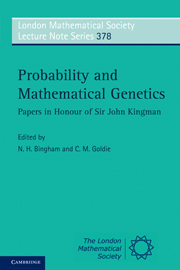Book contents
- Frontmatter
- Contents
- List of contributors
- Preface
- Bibliography of J. F. C. Kingman
- 1 A fragment of autobiography, 1957–1967
- 2 More uses of exchangeability: representations of complex random structures
- 3 Perfect simulation using dominated coupling from the past with application to area-interaction point processes and wavelet thresholding
- 4 Assessing molecular variability in cancer genomes
- 5 Branching out
- 6 Kingman, category and combinatorics
- 7 Long-range dependence in a Cox process directed by an alternating renewal process
- 8 Kernel methods and minimum contrast estimators for empirical deconvolution
- 9 The coalescent and its descendants
- 10 Kingman and mathematical population genetics
- 11 Characterizations of exchangeable partitions and random discrete distributions by deletion properties
- 12 Applying coupon-collecting theory to computer-aided assessments
- 13 Colouring and breaking sticks: random distributions and heterogeneous clustering
- 14 The associated random walk and martingales in random walks with stationary increments
- 15 Diffusion processes and coalescent trees
- 16 Three problems for the clairvoyant demon
- 17 Homogenization for advection-diffusion in a perforated domain
- 18 Heavy traffic on a controlled motorway
- 19 Coupling time distribution asymptotics for some couplings of the Lévy stochastic area
- 20 Queueing with neighbours
- 21 Optimal information feed
- 22 A dynamical-system picture of a simple branching-process phase transition
- Index
18 - Heavy traffic on a controlled motorway
Published online by Cambridge University Press: 07 September 2011
- Frontmatter
- Contents
- List of contributors
- Preface
- Bibliography of J. F. C. Kingman
- 1 A fragment of autobiography, 1957–1967
- 2 More uses of exchangeability: representations of complex random structures
- 3 Perfect simulation using dominated coupling from the past with application to area-interaction point processes and wavelet thresholding
- 4 Assessing molecular variability in cancer genomes
- 5 Branching out
- 6 Kingman, category and combinatorics
- 7 Long-range dependence in a Cox process directed by an alternating renewal process
- 8 Kernel methods and minimum contrast estimators for empirical deconvolution
- 9 The coalescent and its descendants
- 10 Kingman and mathematical population genetics
- 11 Characterizations of exchangeable partitions and random discrete distributions by deletion properties
- 12 Applying coupon-collecting theory to computer-aided assessments
- 13 Colouring and breaking sticks: random distributions and heterogeneous clustering
- 14 The associated random walk and martingales in random walks with stationary increments
- 15 Diffusion processes and coalescent trees
- 16 Three problems for the clairvoyant demon
- 17 Homogenization for advection-diffusion in a perforated domain
- 18 Heavy traffic on a controlled motorway
- 19 Coupling time distribution asymptotics for some couplings of the Lévy stochastic area
- 20 Queueing with neighbours
- 21 Optimal information feed
- 22 A dynamical-system picture of a simple branching-process phase transition
- Index
Summary
Abstract
Unlimited access to a motorway network can, in overloaded conditions, cause a loss of capacity. Ramp metering (signals on slip roads to control access to the motorway) can help avoid this loss of capacity. The design of ramp metering strategies has several features in common with the design of access control mechanisms in communication networks.
Inspired by models and rate control mechanisms developed for Internet congestion control, we propose a Brownian network model as an approximate model for a controlled motorway and consider it operating under a proportionally fair ramp metering policy. We present an analysis of the performance of this model.
AMS subject classification (MSC2010) 90B15, 90B20, 60K30
Introduction
The study of heavy traffic in queueing systems began in the 1960s, with three pioneering papers by Kingman [26, 27, 28]. These papers, and the early work of Prohorov [35], Borovkov [5, 6] and Iglehart [20], concerned a single resource. Since then there has been significant interest in networks of resources, with major advances by Harrison and Reiman [19], Reiman [37], Williams [43] and Bramson [7]. For discussions, further references and overviews of the very extensive literature on heavy traffic for networks, Williams [42], Bramson and Dai [8], Harrison [17, 18] and Whitt [41] are recommended.
Research in this area is motivated in part by the need to understand and control the behaviour of communications, manufacturing and service networks, and thus to improve their design and performance.
Information
- Type
- Chapter
- Information
- Probability and Mathematical GeneticsPapers in Honour of Sir John Kingman, pp. 416 - 445Publisher: Cambridge University PressPrint publication year: 2010
Accessibility standard: Unknown
Why this information is here
This section outlines the accessibility features of this content - including support for screen readers, full keyboard navigation and high-contrast display options. This may not be relevant for you.Accessibility Information
- 8
- Cited by
